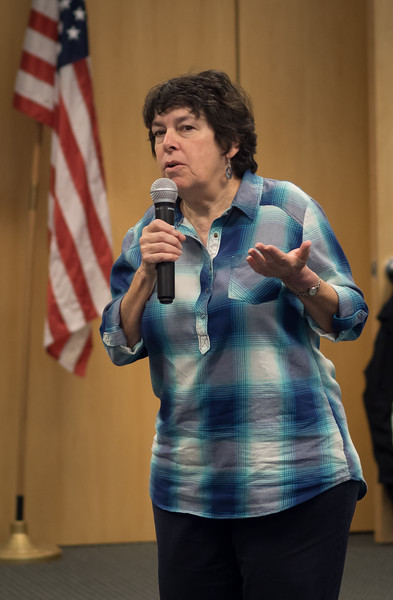by Rebecca Band
It’s no secret that union membership is on the decline, and that downward trend has been ongoing for more than a decade. With such discouraging numbers and a slew of pundits claiming that unions are “dead” and “a thing of the past,” it’s easy to jump to the conclusion that the American Labor Movement is heading off a cliff and may never recover.
But according to Judy Ancel, history professor and Director of the Institute for Labor Studies at the University of Missouri in Kansas City, it’s times like these that have historically brought about a massive resurgence of the Labor Movement – so instead of bracing ourselves for the end of organized labor, we should be preparing to see a major boom in union membership in the very near future.

History professor Judy Ancel delivering one of her famous history lessons at the IBEW 1245 Advisory Council meeting
During an informative and interactive presentation to the IBEW 1245 Advisory Council on Jan. 24, Ancel pointed out that union membership saw a similar decline in the late 1920s and into the early 30s. Economists and so-called “experts” back then made the same predictions they’re making now, claiming that the demise of organized labor was inevitable. They even cited many of the same factors we’re hearing about today — weak labor laws, aggressive union-busting by employers, a consumer-driven society, loss of public support, technological advancements, the growth and strength of corporations — as the rationale behind their predictions.
But unions didn’t die in the 30s. Quite the opposite. These factors, which experts thought would mean the end of organized labor, actually spurred some of the most aggressive and effective union organizing efforts in our nation’s history, and lead to a period of historic union growth and strength that lasted for decades.
“These reasons and excuses have been recycled over and over in order to discourage us,” Ancel told the Advisory Council. “So don’t listen to predictions by economists or pundits about labor’s future. There will always be a labor movement.”
Ancel, a labor history professor and life-long union activist, has done dozens of presentations at various IBEW conferences, prompting the Local 1245 Executive Board to invite her to come deliver one of her famous “history lessons” to our Advisory Council.
“The wonderful historian Howard Zinn said … If you don’t know history, it’s as if you were born yesterday. And if you were born yesterday, any leader can tell you anything, and you have no way of checking it out,” Ancel said. “Our labor history is a treasure chest of lessons. It’s our experience as working people. If we don’t know it, we’re bound to fall for every kind of craziness. We have to learn from history so we don’t repeat the mistakes of the past.”
Ancel went on to explain how unions have always organized “in spurts” and that times of great inequality tend to lead to periods of robust union growth. Her history lesson focused on how organized labor has evolved over the decades, and continues to grow and change as the workforce grows and changes.
“Labor has repeatedly reinvented itself and adopted new organizing strategies and tactics in response to changes in the organization of the economy,” she pointed out. “Innovation usually does not come from the top down. It comes from the bottom up.”
Ancel’s history lesson started at the founding of our country, when most all labor was slave labor and indentured servitude.
“Our history is grounded in the labor of slaves and servants, and has been marked by the continuous struggle of the worker against the lash, to be treated as a human being rather than a commodity, a thing,” Ancel noted. “Slavery and servitude set the bar very low and left their imprint on labor-management relations.”
She recounted the long and difficult struggle for labor rights, and pointed out that 200 years ago, American courts rules that any effort by workers to come together for workplace rights or wage increases was considered a “criminal conspiracy.”
“For most of our history, unions have operated without protection of law — and often in violation of it,” Ansel said. “Facing the combined power of government and business has been the norm for American workers.”
She also pointed out how for centuries, race, class and immigration status have always been used by the rich and powerful to pit the working class against one another, an issue that still rings true today. In fact, nearly every lesson from Ancel’s history tutorial had the same conclusion – none of the problems we have as a working class are new or unique. We’ve been through it all before, and if we learn from our history, we can continue to conquer every hurdle that comes before us.
Ancel spoke for nearly two hours, but says that she “barely scratched the surface” of labor’s full history. She concluded her presentation by encouraging everyone to take a labor history class, read a book or watch a historical labor movie; anything we can do to keep labor history and education alive will inevitably help us to grow and strengthen our union and the Labor Movement.
For more lessons from Professor Ancel, check out archived editions of her radio show, “Heartland Labor Forum” //cas.umkc.edu/labor-ed/shows.htm.